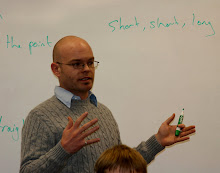Suggestions
- Blogs allow students to publish their work, foster communication beyond the classroom, and encourage writing, reading and critical thinking skills.
- Blogs also allow students to participate more in their learning.
- Wikis encourage students to create content, edit content, and reflect upon content.
- Wikis actually encourage community building and academic integrity.
- Really Simple Syndication (RSS) provide students and teachers with a tremendous breadth of information used for research purposes.
- Podcasts provide a tool for students to create their own radio broadcast of whatever subjects they choose which can then be published to the web.
Considerations
- Teachers need to teach students how to question and evaluate web content based on source information.
- Teachers need to teach students how to publish to the web.
- Teachers need to accept a shift their perspective from a "content expert to a guide" which also begs the consideration that teachers must participate in this online collaboration.
- Teachers and schools need to decide between a climate of blocking content or teaching students to make responsible and mature decisions regarding reading and writing the web.
Richardson offers practical suggestions as well as thoughtful analysis of reading and writing the web. The tools he offers as educational tools seem tremendous, specifically in eliminating the vacuum in which so much writing in schools is traditionally suffocated. By publishing to the web students suddenly see their work as available to others; simply, it has meaning beyond a grade. I am particularly intrigued by the potential that exists in students and classes creating blogs and wikis. However, I am somewhat unsure of how to create RSS feeds and podcasts.
In addition to the dynamic opportunities created, Richardson's points to consider held profound relevance. To begin with, his insistence upon teachers participating in the process of collaborating makes a great deal of sense as does the shift from content expert to guide. This perspective shift alters the whole education experience for students and teachers alike. Finally, the idea of blocking or censoring sites seems limited when compared to the educational opportunity to teach students to make informed, responsible and mature decisions regarding material they read, source and produce.


No comments:
Post a Comment